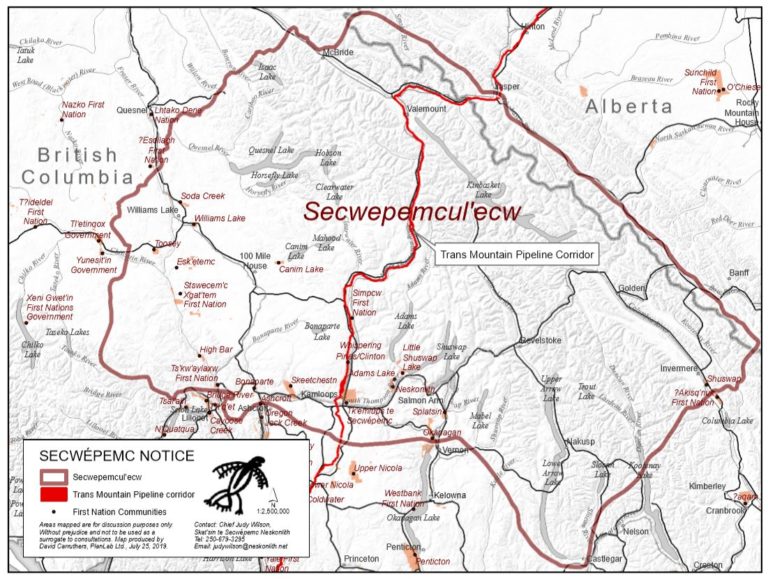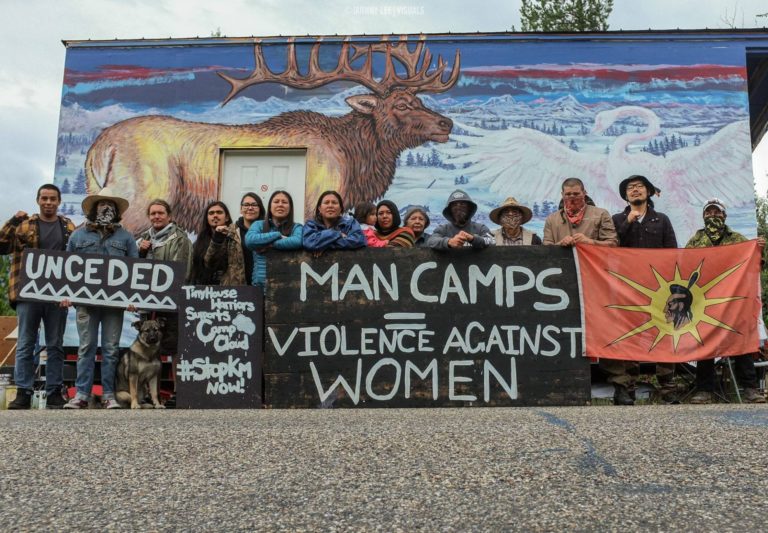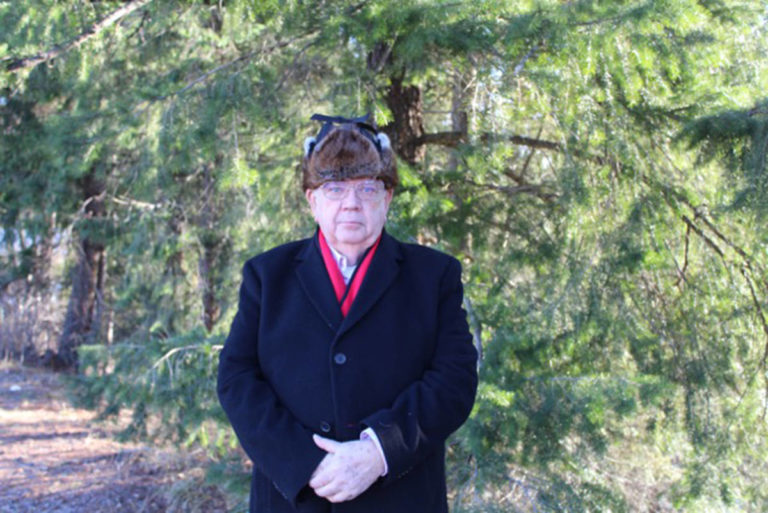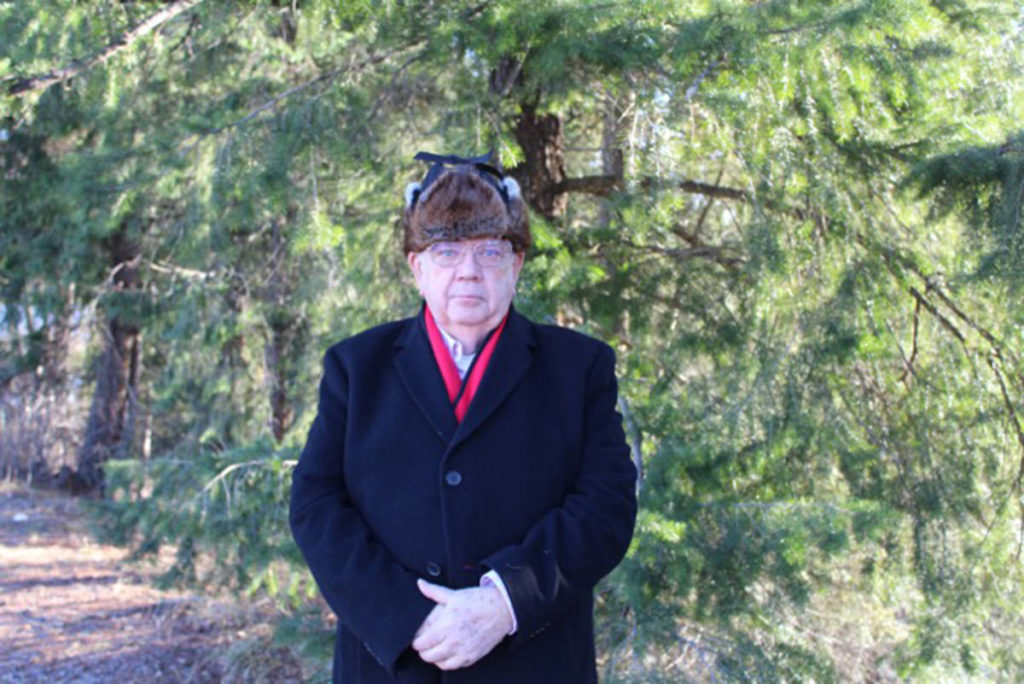Pipeline supporters plan rally to “reclaim” Indigenous land
Business owners, local politicians want Secwépemc houses removed
Angry residents of Blue River, B.C. are calling for a “rally to reclaim the North Thompson Valley” on Saturday, as Secwépemc land defenders refuse to leave a piece of land where Trans Mountain plans to build a 500-worker camp.
Rally organizers sent a release to media saying “the people who rightfully call the valley home – all people – have had enough of the illegitimate protest and their vulgar and divisive methods. It’s time for them to leave.”
But members of the Tiny House Warriors, as well as at least one Secwépemc chief, point out the North Thompson Valley is part of the Secwépemc Nation, and was never sold or surrendered to the Crown.
While individual band councils have signed agreements with Trans Mountain and the federal government, a Secwépemc Assembly held in nearby Clearwater in 2017 affirmed the collective opposition of Secwépemc people to the new pipeline.
With construction slated to begin this summer, people on both sides warn the situation is escalating. Two elected chiefs have come out against the Tiny House Warriors. Premier John Horgan told them to “call the cops.” Local officials say that’s not enough – they want pipeline opponents removed for good.
A land cut in half
“Set amidst the pristine landscape of the Upper North Thompson Valley, Blue River is surrounded by lush interior rainforests of cedar and spruce, sparkling glacier fed lakes, and majestic mountain peaks,” says the town’s website.
Blue River itself, population 260, is a logging town halfway between Kamloops and Jasper, with a few tourism businesses. It’s also on the route of the Trans Mountain expansion project, which would cut through the middle of Secwépemc territory.

Like most Indigenous territories in B.C., Secwépemc land was claimed by the British Crown in the 1850s. Colonizers wrote the name of the nation as “Shuswap”, which is how it appears on B.C. maps. Secwépemc people who survived waves of devastating disease were confined to small reserves governed by the Indian Act. Canada recognizes 17 Secwépemc bands today.
One of those bands, the Simpcw First Nation, asserts jurisdiction over the Blue River area. Simpcw also operates a group of companies that have contracted with Trans Mountain since 2008, when previous owner Kinder Morgan undertook the 160 kilometre Anchor Loop expansion in Jasper National Park. Simpcw Resources LLP also provides private security services along the Trans Mountain route.
“In 2017, we gave our free, prior and informed consent to Trans Mountain to build and operate the new pipeline here,” Simpcw First Nation Chief Shelley Loring said in a joint statement with Tk’emlups te Secwepemc Chief Rosanne Casimir. “We respect the positions taken by other Secwepemc on the project and fully acknowledge that each of us has the responsibility and jurisdiction to make their own decision.”
But another chief, Kukpi7 Judy Wilson from the neighbouring Neskonlith band, said in a statement that what happens on collective Secwépemc territory is not up to elected band councils.
“Since these two Kukpi7s – like our Council – are operating through the Indian Act, and since the Trans Mountain Pipeline Expansion Project is located off-reserve, even the Canadian courts – which are in a conflict of interest – recognize that Aboriginal Title and Rights are held collectively by the Indigenous Peoples, not by one or two Indian Act bands,” Wilson writes.
Wilson affirms the Neskonlith community’s ongoing opposition to Trans Mountain, and calls for another urgent, nation-wide Secwépemc Assembly, outside the band council system, to discuss the current controversy.
Business owners call for crackdown
Trans Mountain has begun construction on large temporary work camps in Valemount and Clearwater. Public health researchers have found worrisome links between industrial “man camps” and violence against Indigenous women. That’s why the Tiny House Warriors have occupied so-called Crown land in Blue River, vowing to block a third 500-bed pipeline camp in the area.

Land defenders at the Tiny House Warriors camp.
But local business owners in Clearwater and Blue River say they were looking forward to pipeline workers spending money in town. They’re upset by the Tiny House Warriors’ presence over the last two years.
“It’s very vulgar,” says campground operator Michael Nesterski. “This group is in town harassing businesses, they’re harassing people, they’re using foul and racist language,” complains Regional District Director Stephen Quinn.
Quinn, who was born in the UK, is frustrated by what he sees as a lack of action by the RCMP. “Is there in fact two kinds of law in Canada? One for rural areas and one for urban areas? This really goes to the heart of rule of law and democracy.”

Thompson Nicola Regional District area director Stephen Quinn.
Prompted by complaints from Quinn, Nesterski and others, local MLA Peter Milobar is calling on the provincial government to intervene: “Anyone has a right to protest, absolutely, but business owners, after two years, also have a right to quiet enjoyment of their own properties as well.”
“I cannot tell the cops what to do,” Premier Horgan said in response. “But if citizens who they are charged with protecting have concerns, law enforcement in my opinion, should respond to that.”
Fears of further violence
“My biggest concern is it’ll turn into violence,” Quinn told a local paper. “You hear that on the street and it doesn’t take long to go from mumbles and grumbles on the street to something serious.” But violence has already arrived, at least for the Tiny House Warriors.
The night of April 19, with COVID-19 cases surging in B.C., a group of men rammed ATVs with Alberta licence plates through a barricade controlling access to the camp. The attackers, visibly drunk, shouted racist abuse and tore down red dresses hung in memory of murdered and missing Indigenous women.
They stole a truck belonging to camp leader Kanahus Manuel and rammed it into one of the wooden tiny homes where she fled to escape attack. Then they drove her truck into a utility pole and left. “If this was the other way around, and there were three native men who stole a white woman’s truck and plowed it into a white woman’s house, there would be a manhunt,” Manuel told the Toronto Star.
Clearwater RCMP Sgt. Grant Simpson said police are investigating the April incident. But that hasn’t stopped near-constant surveillance and harassment of camp residents by police and civilians alike. Now, with the “Rally to Reclaim the North Thompson Valley” scheduled for Saturday, right-wing activists appear to be swinging into high gear. Yesterday Aaron Gunn from the “BC Proud” outlet was spotted flying a drone over the Tiny House Warriors camp.
Time for leadership
The standoff at Blue River highlights unresolved questions over who owns the land and who gets to decide what happens on Secwépemc territory. The federal government bought the project with our tax dollars and approved it – twice. The federal courts ruled the government’s second round of consultation with First Nations was adequate for construction to proceed. For Prime Minister Trudeau, it’s full steam ahead.
Business owners and local politicians want Secwépemc land defenders cleared out so a pipeline camp can be built on “Crown” land. But the Tiny House Warriors, Neskonlith chief Judy Wilson and the 2017 Secwepemcúlecw Assembly say it’s not up to business owners or Ottawa whether Trans Mountain gets built. For that portion of the route, it’s up to the Secwépemc people as a whole.
The provincial government claims to oppose the Trans Mountain expansion. And in the case of the Wet’suwet’en hereditary chiefs, B.C. has shown a willingness to engage with traditional governance structures outside of the Indian Act system. B.C. should support Kukpi7 Wilson’s urgent call for a Secwépemc assembly – and provide the resources to safely convene people during COVID-19.
In the meantime, Premier Horgan should stop telling Blue River residents to “call the cops.” RCMP enforcement against Secwépemc land defenders would not only be premature in the absence of a decision by the nation and its collective title holders. It could also be the spark that triggers support actions across B.C. and Canada similar to the Wet’suwet’en support actions that prompted a major political crisis in February.
You can make a donation to the Tiny House Warriors on their website.


You’ve sent me this info…but no link to what I can do.
I’ve been through this area a few times as a cycle tourist and have stayed a few nights….it’s gorgeous, and I loved it. To have seen the Kinder Morgan station at the time truly upset me.
I’m upset with Horgan’s comments…I’m upset with Stephen Quinn that feigns power. The land defenders know better than to allow a pipeline through this pristine land…What can I do? I feel like pedalling my bicycle up there and becoming one of the protesters.
The RCMP need to leave these territories and cease harassment of the Secwépemc Peoples. Unceded territories being stewarded by land and water protectors is sacred and needed in this time of Climate Crisis. We have less than 10 years to turn this ship around. We cannot continue Fossil Fuel Extraction projects like this and maintain life on earth.
We cannot Eat money or Drink Oil.
We must support Water and Land defenders on their lands. Period!
Where are the RCMP when we need them to find the murdered and Missing Indigenous Women and Girls?! They are out every day harassing Infigenous Wlmwn and Girls!! This must Stop!
May the next 7 generations be successful in saving water and land for their children and theirs.
Laura Zadorozny
#waterislife
#nomorepipelines
Yes, if there is violence or police intervention in Blue River this weekend, Dogwood should take leadership and organize road and rail disruptions at multiple locations around the province while calling for solidarity across the continent. Petitions aren’t going to solve this in our favour.
This is all so wrong on so many levels; pipelines we don’t want, fighting, wasted time having to protect land, hate, destruction, bullying, greed and Government lack of responsibility protecting our planet. All this when we should be concerned with our health and building sustainable green energy!! Wake up!
If the land defenders can stop or delay TMX they’ll be doing all Canadians a service. The future lies in sustainable energy, not in fossils. Man camps are a threat to public health and safety.
Stand Strong My Sister’s and Brothers❤️🌈❤️All that is done with Love WILL BE🌈
WE CAN’T KEEP DESROYING OUR LANDS IN THE NAME OF ECONOMY. WE MUST FIND SUSTAINABLE RESOURCES TO HELP US SURVIVE! HOW CAN INTELLIGENT PEOPLE BE SO BLIND! IT HAS TO STOP>>> NOW!!!!
Thank-you for your research on this. Very disappointed in Horgan’s call for violence against people seeking justice.
Keep up the fight, Tiny House Warriors!
All land on Turtle Island(north america) belongs to every single Original Peoples of Turtle Island, so one band alone can make a decision that all Original Peoples of Turtle Island have to make collectively. This land belongs to everyone of us Original Peoples of Turtle Island(north america) Period!
This article is very biased and not very credible. The writer mashed up different pieces from other articles together without the ‘real’ context behind it. The reason that the community in Blue River want to remove THW’s camp in Blue River is that the group constantly harassed locals and visitors and took videos & photos of random people without their content and posted on their social media with racist slurs. They blocked the road that leads to a very well known lake in the area and shouted racist slurs & threatened people whenever the group come in contact with people. This is happening almost every day. I am not a pro pipeline, nor I support the man camp, but I don’t think the community in Blue River deserve this. This concerns the safety of people in Bue River, especially the family with little ones.
The following articles are from more credible source.
https://www.kamloopsthisweek.com/news/tnrd-wants-meeting-with-premier-to-talk-about-tiny-house-warriors-1.24172339
Have a vote, if the majority want it. Then let it happen.
That’s how democracy works.
A minority shouldn’t be able to bully a majority of peaceful people, either way
Seems the easiest thing would be to build the “man camp” in one of the communities eager for business and have group transportation to the work site.
You are so right!!! The world doesn’t need anymore pipelines!!! With that goes the fracking & man camps!! Who stalk & murder our Native women & bring drugs into the community like they do in every Native land they try to pass through!! #stopthepipelines
Hard to believe this is 2020 and we still ignore the call for reality regarding our land (planet earth) we continue to wreck havic on it and ignore the call for sensibility regarding protecting the land and the original inhabitants. Wake up and deal with this ongoing issue. Who wants control? Big business and government…. Who cares about the future of our Planet Earth????
Hi Lauren, thanks for posting the other link. It seems to confirm the same basic info. I note the newspaper uses an image of the woman whose truck was stolen- and it looks as if it was taken and used without her consent because she isn’t posing, but perhaps it’s a clip from a video interview? I can understand why the community would be upset by the intimidation you describe but I wonder what the community feels about the larger picture? Will people living there feel more or less safe with 500 men arriving to build a pipeline during a pandemic? From afar, it looks as if the Tiny House Warriors’ land occupation is saving lives on two fronts at the moment! Climate change AND the virus is being staved off by their sweat equity as we speak. If the group are not perfect angels while accomplishing this, well…I can only imagine how rude and cranky I would be their shoes. There is also the bigger picture, involving the agreement Harper made with China in 2012 (FIPA) and the effect this (and agreement like it) may be having on Canadian sovereignty. What we’re seeing is manifest pressure by the 1% – when the 1% own the economy, and can access the armed forces to close their business deals by force…what is a handful of protestors to do against such monumental power? Sorry for your situation – and thanks again for the other source reference.
Are you referring to the small group of very wealthy oil and gas moguls or the small group of protesters?
It’s ironic campground operator Michael Nesterski called the Tiny House Warriors “vulgar” after saying they were “looking forward to pipeline workers spending money in town”: To me, such crass commercialism (caring more about making money than respecting others) is the DEFINITION of vulgar!!?
This nasty incident makes BC’s future look depressingly bleak –climate action a seeming non-issue to pro-pipeliners & Govt. (contrary to Horgan’s claims), & local biz “leaders” getting away with what should be obsolete colonial attitudes toward 1st Nations — who are fighting noT just for their own long-denied basic rights but against the UNFAIR bullying of polluting BigOil ploughing thru their TINY territories without retraint: V. TROUBLING..
Where’s the promised UNDRIP from our leader?? & HOW are the gross actions by those Albertan bigots –let alone advice to “call the cops”– even REMOTELY OK??
This disturbs me — I thought BC was heralding in a new age of respect for 1st Nations, along with new policies to fight climate-changing degradation of BC — to which Horgan has paid lip service (with forked tongue?)?
The Albertans should be dealt with severely, & charged on several counts, as a warning to others for their violations against protesters on their own land — esp. with the prospect of a (potentially violent/unlawful) MAN CAMP looming??
I back the Tiny House Warriors 100%, & would like to offer more support — if called upon. I shall await your word (please do not hesitate)
So who will stop the pipeline and save out beautiful forests and putmoney into health care rather than ruining our climate?